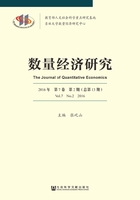
On Evaluating How Unexpected Shocks Affect Government Debt Risk in China: Evidence and Outlook
Abstract: Considering the fact that the government debt to GDP in China is relatively low and macro-economic control mainly rely on fiscal measures recently, this paper considers the impact of unexpected shocks on the government debt risk aiming to reduce government precautionary motive and release fiscal policy space. First, using some empirical analysis to demonstrate that unexpected events do affect government debt risk, including government debt risk rational expectation test, exploration effect channels and mechanisms and simple logic analysis under a financial prospective management assumption. Then, under the framework of the fiscal reaction mechanism, we analyze the valid fiscal reserves responding to emergencies, and then give a further analysis of the specific impact on government debt risk. The results show that unexpect-ed shocks are a factor influencing government debt risk truly, and there are two paths emergen-cies affect government debt risk. Specifically, one is fiscal adjustment channel which causing the fiscal volatility, and the other is a relatively complex channel, such as the financial crisis, which can lead government expectation inertial. Moreover, fiscal reserves responding to emer-gencies within the budgetary system do not determine the government debt risk fundamentally, and considering the reality that China is in the early stage of“fiscal fatigue”and fiscal re-serves, the“reserve channel”of fiscal adjustment, has not yet reached the optimal stock, so government should increase inputs to prevent unexpected shocks which is meaningful in terms of controlling government debt risk.
Key Words: Government Debt Risk Unexpected Shocks Fiscal Reaction Function Fiscal Reserve